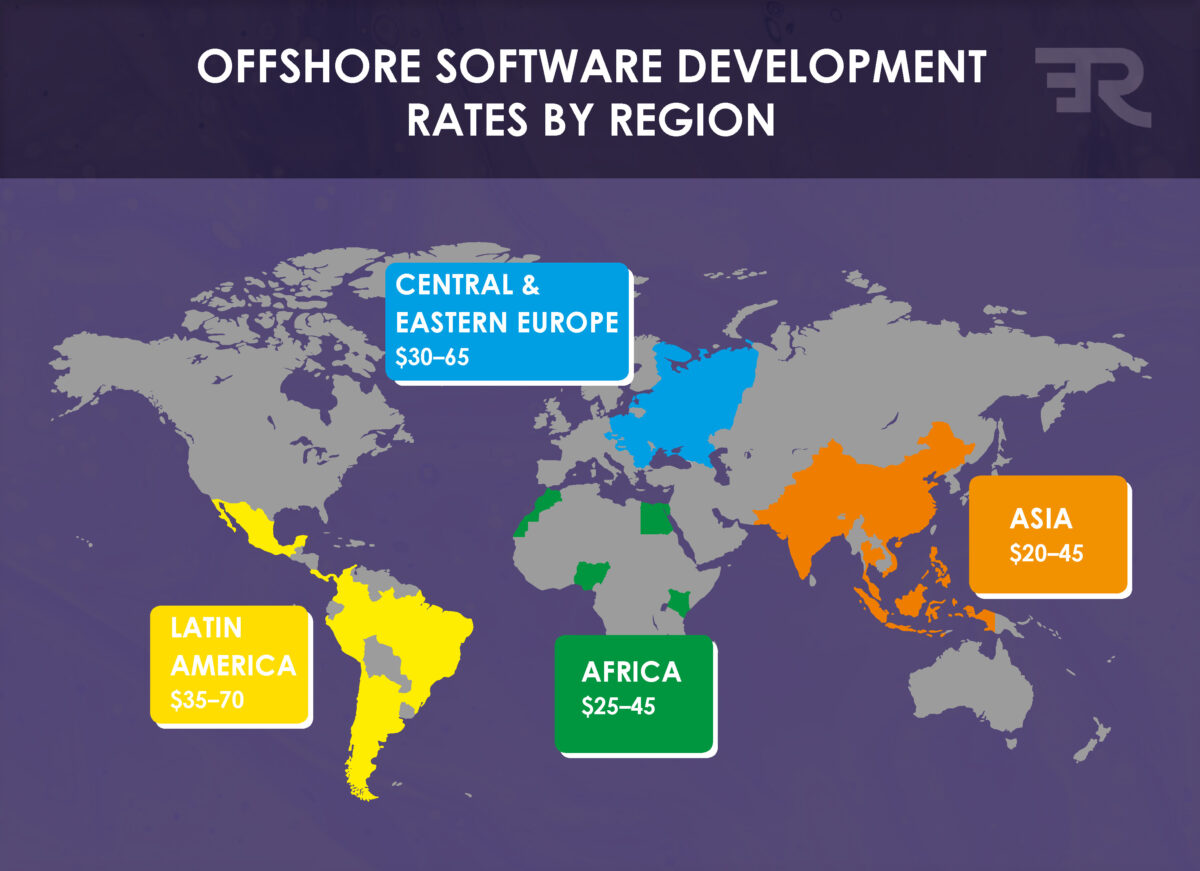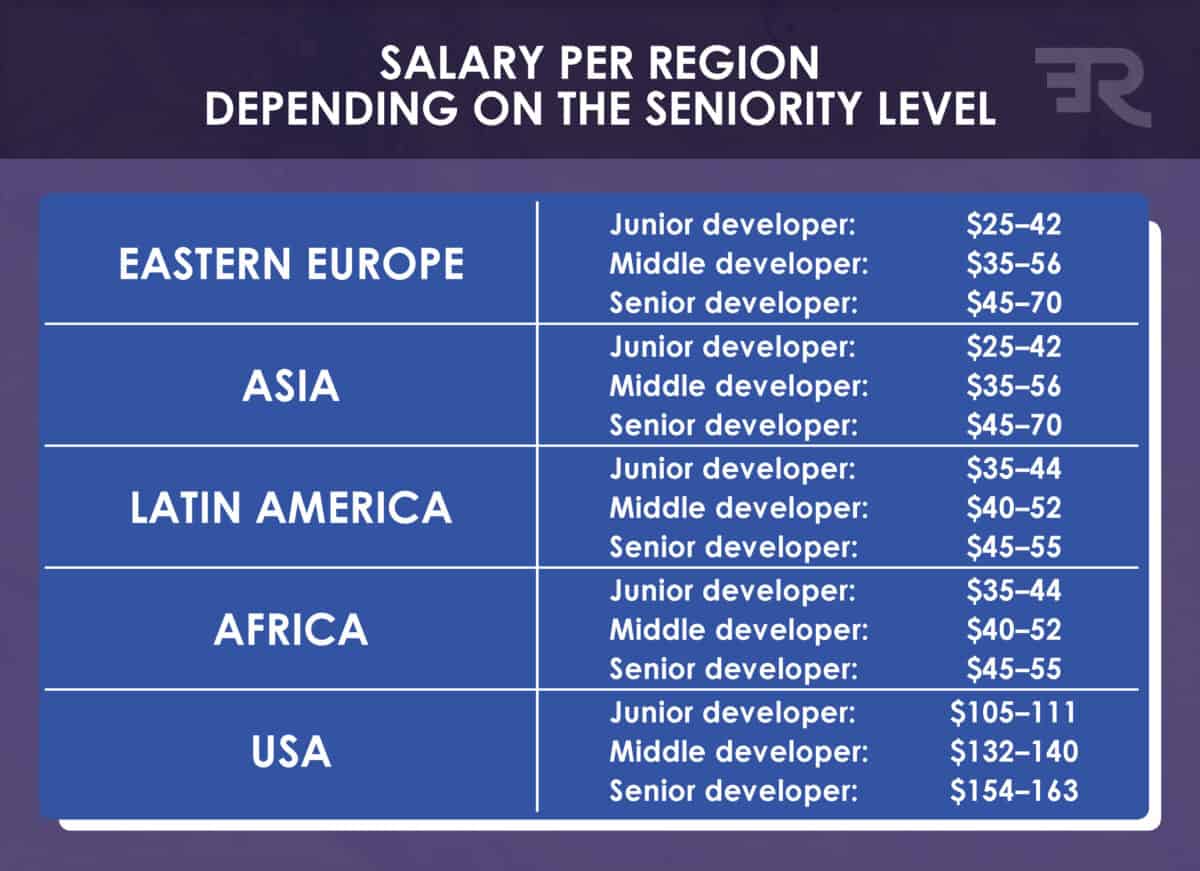
15 min read
Your Primer on Offshoring Software Development: Pros and Cons
IT executives say the most significant challenge and barrier to adopting new sixty-four percent of new technologies is a talent shortage. Meaning that even with great project ideas, most companies can’t bring them to life with their current in-house development team. Who knows how many great products the world missed out on because of this talent scarcity? Thankfully, not all great ideas are doomed, as Internet access and globalization gave us offshoring software development with all its pros and cons.
If you have a vague understanding of this concept and don’t know how it’s different from nearshoring, onshoring, or outsourcing in general, read on. We’ll discuss the concept, its pros and cons, and offer some advice on hiring offshore software developers.
Let’s start with the basics.
What is Offshore Software Product Development?
People often use the terms offshoring and outsourcing as synonyms. In some cases, they are close in meaning because offshoring is one type of outsourcing that’s determined by geography. Whether outsourcing is considered offshoring depends on your location and the vendor’s location. We’ll explain why people confuse the terms shortly, but fundamentally, it’s incorrect to say that offshoring and outsourcing are the same. Let’s see why.
Businesses that outsource software projects or parts of projects, that is, entrust management or development of a project to vendors, can use the services of an onshore, nearshore, or offshore software development company.
In short, we can explain the differences between the three categories of outsourcing like this:
- onshoring means finding a vendor in the same country where you’re located,
- nearshoring means hiring developers in a country that neighbors yours, and
- offshoring project development means hiring a team in countries remote from your own (i.e., foreign companies).
For instance, if you’re located in the US and hire developers located in the US, that’s onshoring; if you hire developers in Canada, that’s nearshoring; and if you hire developers in Eastern Europe, Asia, or Africa for a project, you’re contracting an offshore company to work on your project.
Each category has its advantages and disadvantages. For example, onshore and nearshore developers usually share the same business culture and time zones but are more expensive than offshore.
In recent years, the leading outsourcing destinations used by the US, Australia, and Western Europe are offshore regions, such as Latin America, Eastern Europe, and Southeast Asia. That’s why outsourcing and offshoring have become synonymous for many.
But why it happened that most businesses choose remote countries for IT project development, we’ll consider in the next section.

Benefits of Offshore Software Development
Offshore software development is one of the most in-demand services, outperforming in-house hiring, onshoring, and nearshoring on many parameters. Below, we list a few.
Lower cost of offshore software development
Offshoring can save money in a few ways.
Cutting operating expenses
Whether you hire a freelancer, an outsourcing agency, or an extended team, you don’t need to take on the administrative and operational costs, such as office facilities, paid days off, benefits, employment taxes, and more. You pay only for the work of hired specialists, which saves you, on average, 31% of the total cost only on benefits, according to the US Bureau of Labor.
Saving on recruitment time and costs
By hiring an agency, you don’t need to pay recruiters or spend months searching for experienced specialists. For example, Expert Remote can recruit and onboard a specialist for you within days.
Making use of offshore software development rates by country
The biggest benefit of offshoring is the possibility of finding experienced and skilled IT experts from countries at a much lower rate per hour than in the US, for example, Ukraine, Colombia, South Africa, or India. Just look at the rates and choose the one that suits your budget (as long as it meets your project’s needs).


Access to a global talent pool
Offshoring offers a global talent pool — you can choose to hire from any of dozens of countries. Some countries specialize in providing outsourced talent and have a vast pool of experts, even in the most demanding specialties. For example, in 2021, the Ukrainian tech talent market only comprised around 285,000 specialists. If you choose an offshore vendor with a large base of specialists in top outsourcing locations, finding a qualified software engineer or business analyst won’t be a problem.
Knowledge sharing and innovation
Offshoring, in many cases, comes with significant cultural differences between a client and developers. But when working with experienced and skilled specialists, these differences can bring advantages. By involving specialists with different cultural backgrounds and approaches to work, you gain a different perspective on the typical development processes. As a result, you get fertile ground for innovation and the exchange of experience and ideas.
Drawbacks of Offshore Outsourcing of Software Development
Everything has bad and good sides, and offshoring is no exception. It’s essential to know about the potential challenges of offshore software development before jumping in. That way, you can manage and overcome them. Let’s take a look at them.
Limited control over project tasks
As a client, your involvement in the project depends on the terms of collaboration agreed to with the vendor. But when we talk about offshore software development, we usually mean transferring responsibility for project processes and results to the vendor since the developers are in a remote country.
The client can monitor the work to make timely corrections, but a remote project manager controls the day-to-day processes that affect deadlines, product quality, and overall results. So, you have limited control over the offshore project and must be confident in the vendor’s capabilities.
Language and cultural barriers
Although we highlighted cultural differences as an advantage in the previous section, cultural differences can become a disadvantage. For example, a language barrier can cause communication difficulties. Aside from cross-language issues, communication styles may differ across cultures; one might be more curt or direct than the other, which can result in misunderstandings.
Or work styles may vary across cultures, with a greater sense of urgency in one culture and more laid-back tendencies in another. Deadlines might be more flexible in one culture and more strict in another.
Cultural differences aren’t a big deal, provided you, as a client, endorse good, open communication skills, clarify software development needs and schedules, and state expectations early on. At the same time, the specialists you’re hiring should be cherry-picked according to their talents along with self-organization and other valuable soft skills.
Different time zones
Offshoring usually means several time zones separate the client and vendor’s locations. The time difference can be a problem for matching schedules and effective communication. For example, the difference between Los Angeles and Delhi is thirteen hours, so the client may be sleeping when the vendor is working or vice versa.
But this isn’t an issue for all of the top offshore locations. For example, Poland or Ukraine differs from Western European countries by only 1–2 hours and from New York by 6–7 hours; that means working hours overlap for part of the day. In addition, with many developers working remotely and no longer restricted by office hours, offshore vendors with a large base of specialists can select software engineers whose work schedule is convenient for their clients.
Data security risks
When you work with remote vendors, you entrust them with sensitive data but can’t always be sure of its safety and security. And there may be more security risks in some locations than others. Data leakage is especially sensitive in countries that haven’t adopted generally accepted data policies and laws, such as GDPR. If the country’s laws don’t oblige companies to adhere to strict security policies, the vendor may not use sufficient means to prevent data breaches or hacker attacks.
Not understanding the needs of customers in the client’s country
You and your in-house team know your business needs, and your projects take those needs into account. An offshore team can offer good but untailored solutions, simply not knowing what features and characteristics are important to your business and customers in your country.
Additionally, software engineers and other specialists may work with several clients and projects simultaneously, not giving their full attention to your needs and, thus, delivering poor results.
The good news is that all the disadvantages of offshore software development are conditional and depend on the vendor. As the practices of Expert Remote show, vetting and hiring the right offshore vendor and developers for your projects lets you avoid the drawbacks. And we have some tips on this matter.
How to Hire Offshore Software Developers
The early stages of working with software developers, namely the hiring and onboarding, is the foundation of your future project. By choosing a professional offshore vendor that hires experienced software development specialists, you’ll easily overcome all the challenges and get outstanding results for your project. To achieve this, use the following tips.
Choose the right type of collaboration
Just like when you work with domestic vendors, you can find offshore software development vendors that offer different collaboration and pricing models. For example, some charge a fixed price and transfer all project tasks to the offshore team. But this model introduces risks, such as delays and poor results due to limited control.
Instead, you can hire an offshore vendor to build a vetted team of remote engineers who basically become part of your in-house team for the duration of the project. We call this an extended team model, and it offers all the perks of in-house employees, such as complete control of remote developers dedicated to work on your project. But the vendor takes care of all administrative and operational issues.
You can also choose an in-between model with more or less control according to your needs.
Сhoose a reliable vendor
Choosing a specific collaboration model narrows down the pool of vendor candidates significantly. But you still need to select the one that can best address your needs and satisfy your requirements. This process may include these steps:
- Read up on the vendors’ case studies to ensure that the vendors have sufficient experience and expertise in your field.
- Review the vendors’ employee base; your short list of candidates will include some of them, so analyze if there are specialists that satisfy your requirements.
- Check whether the company’s pricing is compatible with your budget.
- Arrange as many meetings with the vendor’s managers as you need to learn everything about the vendor’s approach to candidate base compiling.
If the company checks all the boxes, that’s your vendor.
Check the vendor’s safety and security policies and practices
Before disclosing details of your project to the vendor, clarify the data practices and protection protocols they use. If they meet the standards, sign a non-disclosure agreement (NDA) with the company, which specifies categories of confidential data and penalties for violating the NDA.
Select candidates proactively
Hiring an offshore vendor saves you from months of recruiting individual qualified specialists. A professional offshore vendor will do the recruiting and preliminary interviewing for you and then involve you in interviewing short-listed candidates. The final decision of who gets hired is up to you. Don’t neglect this opportunity — you can ask some very specific questions that might not be obvious for the vendor to ask and evaluate the candidates’ relevant experience and communication style. Such seemingly insignificant details can save you from many misunderstandings arising from peoples’ cultural or personal differences, so you can choose the person that most “clicks” with you.
Ensure high-quality onboarding of offshore employees
Depending on the collaboration model you select, you can give access to different types of information to outsourced employees, but quality onboarding is a must. Part of that process is disclosing some specific details of your project to new offshore employees, such as:
- Your business goals, vision and goals, as well as your target audience
- Company culture
- Internal company processes, project-related workflows and tools used
- The project’s goals, vision, and target audience that give the specialists a general understanding and direction of work
- Clear project objectives and milestones.
If you choose an extended team model, a crucial step is bringing remote employees into your team like any new in-house employee. That is, you should introduce the extended team of employees to in-house team members and explain their responsibilities. In addition, tell them about the processes and workflows of the team and even about your corporate culture traditions.
This way, high-quality onboarding establishes effective communication and lays the foundation for fruitful collaboration.

Conclusion
Offshore software development is convenient, cost-effective, and quick to delegate a project or part of a project to a development team in a remote country. An offshore vendor can help you recruit fast from their pool of specialists with relevant experience and expertise to meet your requirements, saving you time and money.
Because the most popular offshoring countries have lower cost of developers per hour and a vendor takes care of all operational, recruiting, and administrative processes, they will fit into a limited budget. Moreover, the vendor takes care of those tasks, allowing you to focus on other pressing matters.
Outsourcing to an offshore software development company may have drawbacks: limited control over project tasks, risks of data leaks, and cultural differences. Though, by hiring a professional vendor like Expert Remote that has a significant pool of top-level specialists, you can easily overcome these difficulties and take full advantage of offshoring. Contact our sales team now and experience these benefits for yourself.
Remote tech teams & the future of work blog
Remote tech teams & the future of work blog
Your form has been successfully submitted.

